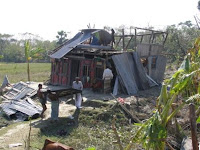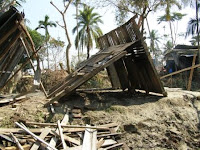Cyclone Sidr Report...
On the 15th of November, 2007,
This has been a devastating year for 
On the 24th of November, Habitat for Humanity International –
The impact of the cyclone was clear; houses either overturned or completely destroyed, rickshaws trampled as if made from cardboard, branches and debris strewn over fields no longer viable to produce crops.
The Assessment Team made its way from village to village, sometimes on motorcycle, often walking due to the condition of r
In one village, I met Imran, father of two, and farmer in a small village situated on the banks of a river. Accompanied by several locals kind enough to translate for me, Imran led me through the village, pointing out the extent of damage caused by Sidr. Unfortunately, there was no lack of evidence to see.
Most of the villagers had lost their homes. Where there had previously stood 5 houses, there was now a shallow pond, bits of wood and clothing and humble furnishings floating on the surface. Where a wooden home had stood only days before there was now only a simple cupboard to mark where a family had previously lived.
The village had made its living through agriculture; as Imran led the way it became apparent not many crops had survived the combination of wind and water. When I q
As we made our way back to the centre of the village, Imran continued to show me the remnants of houses, little shops, what used to be crop fields, even a Mosque which was now nothing but a cement block, all the remaining structure having been swept into the distance.
Along the way I was met with tear after tear; men, women and children were now living in makeshift shelters, made from debris gathered from the site of their original houses, seemingly in a daze and unsure of what to do next.
In spite of the damage and devastation, Imran still considered himself lucky. Through the now small army of interpreters, Imran said he felt blessed that no one had been killed, and only a handful of villagers had been hurt.
The same cannot b
As horrific as the short term damage has been, the effects of Cyclone Sidr will be felt long into the future. As of the 22nd of November, 1,169,567 houses had been either partially or entirely destroyed. Entire crops have been lost; a devastating blow to those already at the edge of human suffering. Livestock has been virtually eradicated from many of these areas, further adding to the scale of this disaster. Without homes, without a source of income, with very limited to non-exist job opportunities available, the future looks bleak for the survivors of Cyclone Sidr.
In the short term, aid has been quick to arrive in
Significantly, much of the funds being distributed for this most recent disaster, as it has been for the floods, is being allocated to temporary emergency relief; just as with the aftermath of the floods, the international community is offering only short term responses to a country in desperate need of a medium 
Having collected stories, pictures and reports from the village, it was time for the Assessment Team to move on to our next potential project area. It was difficult to say good-bye to Imran; with so much need and so few resources available, guaranteeing a response is difficult at best.
Habitat for Humanity International –
By Pierre Johannessen.
Comments